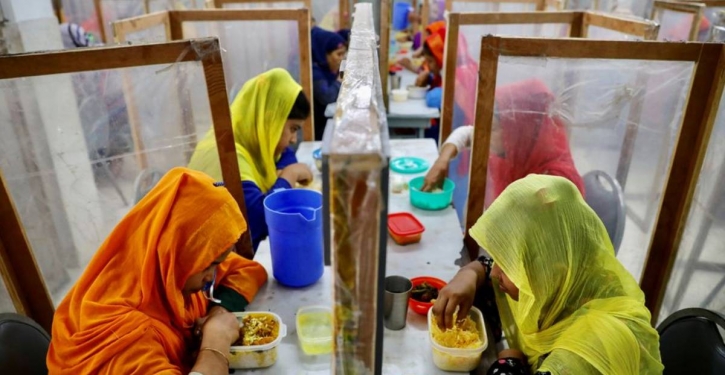17 % of garment workers face verbal, physical harassment: CPD
BI Report || BusinessInsider

Garment workers eat during a lunch break inside a factory. Photo: Collected
Some 17 percent of the apparel workers are being subjected to various verbal and physical harassment in their respective factories, reveals a study done by Centre for Policy Dialogue.
“Not only the females, males are also suffering the harassment, especially in the small factories,” said Khondkar Golam Moazzem, senior researcher of CPD as he presented his keynote paper on a webinar on Saturday. The webinar was organised in partnership with the Christian Aid in Bangladesh on Building the RMG Sector in Adherence with the United Nations Guiding Principles (UNGPs).
The study has been conducted in 200 factories involving over 600 workers.
About 96 percent of small factories don’t post labour laws, human rights on their factory notice boards which have been made mandatory according to ILO.
Some 60 percent of the factories take part in meetings with the government but are reluctant to incorporate the labourers in the process, the study said.
Advocate Sharmin Sultana, a labour court lawyer said there are 201 cases in her court which could not be solved due to limitations of law.
Though, every factory should have a committee to hear the labourers, according to the High Court instructions since the Rana Plaza disaster, but the factories are not complying.
BGMEA president Faruque Hasan emphasised on a unified code of conduct that will ensure the safety and labour law in all sizes of factories.
United Nations Guiding three Principles, duty of state, corporate responsibilities in ensuring human rights and access to remedy on Business and Human Rights (UNGPs) are the global standard which is absent in the country, claimed the study.
The factories are only maintaining necessary certificates but they are not complying with ILO and other conventions. They don’t have labour welfare officers as well.
As most of the workers are female, the factories should have child care facilities, said the speakers but the trade leaders opposed saying the workers are reluctant to the necessity of child care centres.
“We have a big child care home in Narayanganj, but 70 percent of the capacity is unused. We have doctors, cooks and caretakers. The workers prefer home over the centre for taking care of their babies,” said the First Vice President of Bangladesh Knitwear Manufacturers and Exporters Association, Mohammad Hatem.
He also opposes the yearly increment of the workers as the companies cannot make that much profit every year.
He also called the businesses to negotiate for higher prices for the new incoming orders.
Professor Mustafiz, distinguished fellow of the CPD, moderated the programme.
























